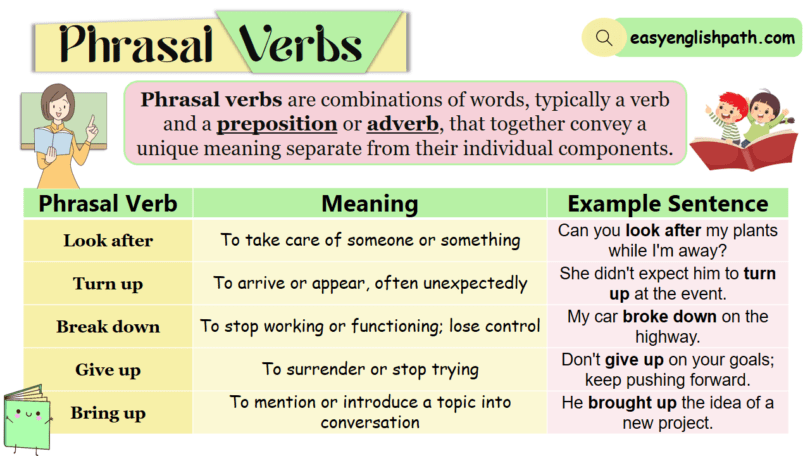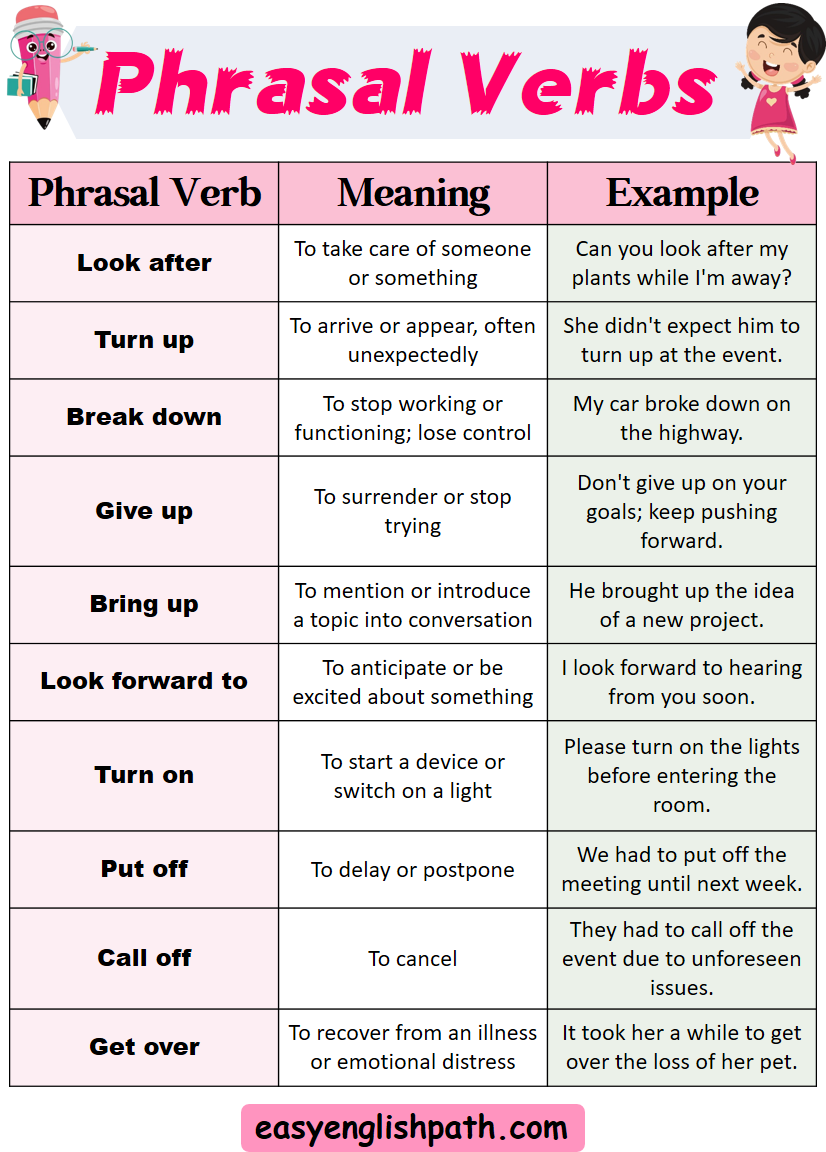- She looked after the baby.
- Please turn in your assignment.
- The cat tried to jump up.
- I ran into my friend.
- Let’s call off the event.
Common Phrasal Verbs:
- Look after: Please look after my cat this weekend.
- Turn on: Can you please turn on the TV for me?
- Bring up: Don’t bring up politics at the family dinner.
- Give up: I won’t give up on my fitness goals.
- Pick up: Can you help me pick up my bag?
- Take off: The plane is about to take off.
- Run out of: We’ve run out of milk; we need to buy more.
- Come across: I came across an interesting article today.
- Go on: What will go on if we miss the bus?
- Set up: Let’s set up a meeting for tomorrow.
- Break up: They decided to break up last month.
- Look for: I need to look for my phone; I can’t find it.
Types of Phrasal Verbs:
- Intransitive Phrasal Verbs
- Transitive Phrasal Verbs
- Separable Phrasal Verbs
- Inseparable Phrasal Verbs
- Phrasal Verbs with Multiple Meanings
- Prepositional Phrasal Verbs
Intransitive Phrasal Verbs:
Intransitive don’t need a direct object to convey their meaning. They stand alone, completing the action without requiring something or someone to receive it.
Examples:
- Show up: She suddenly showed up at the party.
- Go down: The sun is about to go down.
- Break up: The meeting broke up earlier than expected.
Transitive Phrasal Verbs:
Transitive involves a verb and one or more particles, requiring a direct object to complete their meaning. The direct object follows the particle and is essential for sentence coherence.
Examples:
- Pick up: Can you pick up the mail?
- Turn on: Let’s turn on the lights.
- Look after: She looks after her cat.
Separable Phrasal Verbs:
Separable allows flexibility in placing the object either between the main verb and the particle or after the particle. In contrast, inseparable requires the object to always come after the particle.
Examples:
- She turned off the lights.
- She turned the lights off.
- I need to give back your book.
Inseparable Phrasal Verbs:
Inseparable requires the main verb and particle to stay together; the object must always follow the particle. Separating them is incorrect.
Examples:
- I need to make up for the missed class.
- She takes after her mother in looks.
- We should look into the matter.
Phrasal Verbs with Multiple Meanings:
Phrasal verbs with multiple meanings can be interpreted differently based on context. These versatile expressions have more than one sense, and their specific meaning depends on surrounding words or the overall situation.
Examples:
- The new product is starting to take off in the market.
- Let’s check out that new café downtown.
- Can you break down the problem for me?
Prepositional Phrasal Verbs:
Prepositional are combinations of a main verb and a preposition. Unlike others, prepositional always includes a preposition, and the combination creates a specific meaning different from the individual words.
Examples:
- I’m good at coming up with solutions.
- They apologized for the mistake.
- He insists on joining the meeting.
- We’re counting on your support.
- She’s responsible for managing the team.
Phrasal Verb Examples:
- Set up: Let’s set up a meeting for tomorrow.
- Break up: They decided to break up last month.
- Look for: I need to look for my phone; I can’t find it.
- Turn off: Don’t forget to turn off the lights.
- Bring down: We need to bring down our expenses.
- Give in: I won’t give in to peer pressure.
- Pick out: Can you help me pick out a gift?
- Take on: She’s ready to take on new responsibilities.
- Run into: I ran into an old friend at the mall.
- Come up with Let’s come up with a plan.
- Break down: The car might break down if we don’t fix it.
You May Also Like this
- Regular Plural Nouns in English
- Types of Verbs in Grammar






